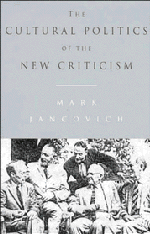Book contents
- Frontmatter
- Contents
- Preface
- List of abbreviations
- Part I The New Criticism and its critics
- Part II The formation of the New Criticism
- Part III The establishment of the New Criticism
- Part IV The development of the New Criticism
- Conclusion: Modernism and postmodernism within the American academy
- Introduction
- 13 The professionalization of literary study
- 14 The New Critical intervention
- 15 Cultural criticism and postmodernity
- Conclusion
- Notes
- Bibliography
- Index
15 - Cultural criticism and postmodernity
Published online by Cambridge University Press: 18 December 2009
- Frontmatter
- Contents
- Preface
- List of abbreviations
- Part I The New Criticism and its critics
- Part II The formation of the New Criticism
- Part III The establishment of the New Criticism
- Part IV The development of the New Criticism
- Conclusion: Modernism and postmodernism within the American academy
- Introduction
- 13 The professionalization of literary study
- 14 The New Critical intervention
- 15 Cultural criticism and postmodernity
- Conclusion
- Notes
- Bibliography
- Index
Summary
It was the New Critical identification of literary study with the analysis of the linguistic forms of the text which defined the preconditions for contemporary forms of literary criticism, such as post-structuralism. Both forms of criticism share an emphasis on the materiality and productivity of language, and a critique of the positivism of modern society. Consequently, despite the continual attacks on the New Criticism, it is this identification which has rarely been challenged. But if both New Critical and contemporary forms of criticism share the same assumptions about what the object of literary study should be, then what is it that differentiates these two forms? According to Fredric Jameson, contemporary criticism is distinguished by the emergence of ‘a kind of writing simply called “theory”’. He argues that the distinctive feature of this new kind of writing is its ‘undecidability’, and that this feature can be seen as a manifestation of its postmodernity. (Forms of criticism, such as the New Criticism, are identified as modernist by Jameson.) For Jameson, the ‘undecidability’ of postmodern criticism is a refusal to define itself within the terms of professional disciplines, but it is better understood if we examine Jameson's analysis of postmodernism more closely. After all, it is the forms of linguistic analysis offered by this new kind of discourse which have proved most attractive to its exponents within the departments of literature, Jameson himself included.
According to Jameson, postmodernism is a reaction against the forms of modernism, and the concepts of unity on which they were based. He identifies postmodernism with the death of ‘History’, the ‘Subject’, and ‘the unity of the text’.
- Type
- Chapter
- Information
- The Cultural Politics of the New Criticism , pp. 146 - 153Publisher: Cambridge University PressPrint publication year: 1993



